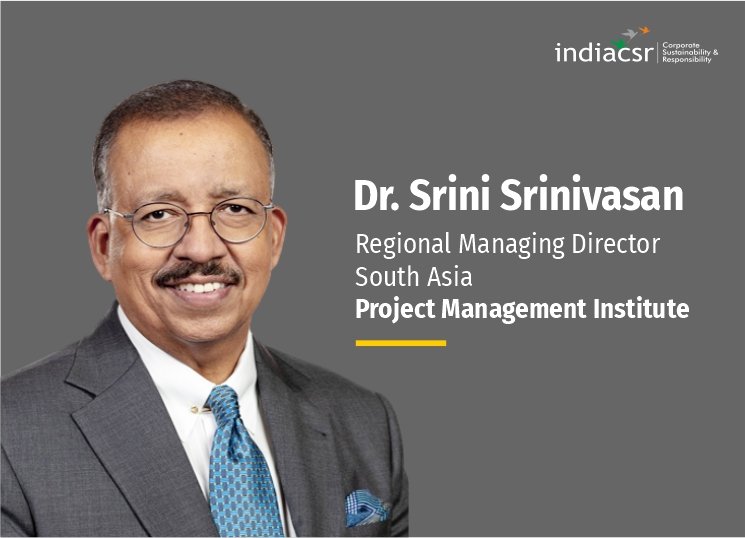By Dr. Srini Srinivasan
Despite having a broad vision for CSR, companies have lacked coordination while executing their programs.
Projects have the power to make a better world. as the world navigates its way through pandemic-driven uncertainty, the need for projects that deliver positive social impact is more urgent than ever. The last two years have brought the need to create a social impact on the forefront in India as well. The workforce of the future is socially aware, sensitive to the needs of the environment and is constantly on the lookout for opportunities to create a sustainable and eco-friendly society.
Hence, it was heartening to see, during the thick of the pandemic, young people collaborating to provide help to families affected by COVID-19. We saw new startups mushroom across the country that are bringing innovative solutions in healthcare, agriculture, and hygiene – all areas of hardcore social impact.
Project leaders appear ready for action. According to Pulse of the Profession research by Project Management Institute, 8 in 10 project professionals cite social impact as a personal concern, and 87 percent say it’s a concern for their organization.
But simply wanting to do good is not enough. The challenge lies in finding a way to bake the concept of positive social impact into all projects—not just the ones that fall under “corporate social responsibility.”
Despite having a broad vision for CSR, companies have lacked coordination while executing their programs. With terms like greenwashing entering the mainstream lexicon, companies must be mindful about where and how they spend their CSR budgets.
Project Management and CSR
Creating a social impact and working towards a sustainable future addressing burning issues like climate change will be the megatrends that will dominate work and lives. Influential projects that are aimed at improving the quality of life, the environment we live in and the infrastructure we use will become a cornerstone of economic development in any country.Project management can facilitate cross-enterprise collaboration between companies and the government, thereby helping project managers to embed sustainability practices into every function, process, and decision across the value chain.
This can help companies transform their abstract CSR vision into a coherent strategy. Goals are broken down intosmaller projects, helping avoid inefficiencies in budget allocation. This can aid in defining clear, tangible, time-bound, and measurable deliverables. Project managers can leverage their expertise to manage these projects systematically and lead the day-to-day execution, becoming instrumental in achieving project-assigned goals. They can perceive and act on socially relevant issues that might be oblivious tosenior management.
Driving Impact in Communities
It’s all too common to see corporations not keeping communities in mind in pursuit of economic expansion. A sense of urgent market opportunity and apathy leads to a lack of accountability. Localized CSR projects are often multifaceted, and an experienced project manager brings discipline in risk assessment and mitigation, which can be refocused to identify social risks that might go unnoticed by the top leadership. For example, Levi Strauss and Company has a strict policy against underage workers.
But when they discovered that two factories in Bangladesh had workers under the age of 15, executives in the U.S. did not shut down the factories or demand the workers be fired. Instead, the project managers in the field investigated the problem, and they recognized that in Bangladesh, families rely on the money brought in from a child worker to survive. So, they helped come up with a creative solution.
The workers who were already employed could remain, but the factory had to support their education, sending them to a local school, even hiring a teacher for the child workers if there were no local schools nearby. That way, the company could invest in, and ensure that the children were getting a proper education, while not driving families into poverty. Ultimately, such “glocal” actions set the standard for other employers.
Closer to home, PMI Education Foundation (PMIEF), in association with volunteers from PMI Chennai Chapter, has been partnering with Project Puthri, a program that runs in Tamil Nadu and Puducherry to improve the career prospects of 10,000 girl students studying in corporation schools. PMIEF and chapter volunteers conduct training on project management as a life skill for girl students across Tamil Nadu.
Driving Impact for the Environment
With depleting resources and increasing environmental stress, Project Managers need to be fiscally sustainable—by managing time and budget as well as socially and environmentally sustainable—by managing resources. However, sustainability isn’t just being “green,” but being aware of the impact on the environment. An example of a small-scale change that project managers can initiate includes sustainable project purchasing decisions including buying energy-efficient, eco-friendly, and recyclable equipment, which generally have lower maintenance and operating costs.
Global cosmetics company L’Oréal is a good example of enforcing sustainability standards across project portfolios. For them, being green is key for all their product development projects. They focus on sustainability across the entire life cycle of each product. Core to this is a structured and disciplined project management framework for product procurement. They review each raw product against a ’25 criteria’ checklist and then incorporate it into their projects. About 40% of the ingredients in L’Oréal’s products are extracted from renewable resources.
Driving Impact During the Pandemic
We saw the turmoil that the whole world faced through the COVID-19 pandemic. What was noteworthy was the initiative shown by quite a few businesses to develop philanthropic associations with NGOs and foundations, actively working towards helping those impacted by the pandemic.
Despite the challenges and huge losses, the reaction to COVID-19 showed that collaboration, smart thinking, clever project management, andperseverance, were capable of tackling one of the biggest struggles humanity had ever faced. With a race against time to develop an effective vaccine, a consortium of businesses worked seamlessly with governments, health officials, and volunteers to manage this multi-layered, multi-party project. From distribution to shipment, every process was a specialized project that had to be managed and executed, and the project Vaccine finally became a reality.
Every project has an impact—and increasingly it’s up to project leaders to make it a positive one. The same strategic mindset behind the drive for bottom-line results must also be applied to ensure projects create a better world.
Whether it’s eradicating hunger or promoting economic growth, delivering social change through The Project Economy is the best way to move organizations and the world—forward.
(The author is Dr. Srini Srinivasan, Regional Managing Director – South Asia, Project Management Institute)
Views are personal.
CopyRight@IndiaCSR



























